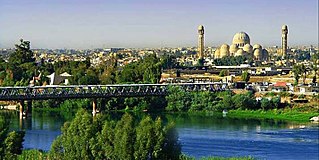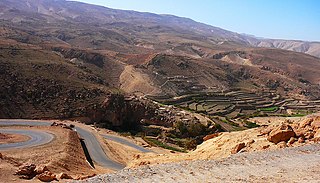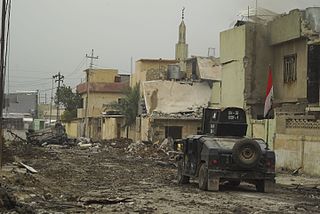
Nineveh Governorate, also known as Ninawa Governorate, is a governorate in northern Iraq. It has an area of 37,323 km2 (14,410 sq mi) and an estimated population of 2,453,000 people as of 2003. Its largest city and provincial capital is Mosul, which lies across the Tigris river from the ruins of ancient Nineveh. Before 1976, it was called Mosul Province and included the present-day Dohuk Governorate. The second largest city is Tal Afar, which has an almost exclusively Turkmen population.
Persecution of Christians in the post–Cold War era refers to the persecution of Christians from 1989 to the present. Part of a global problem of religious persecution, persecution of Christians in this era is taking place in Africa, the Americas, Europe, Asia and Middle East.
Nun is the fourteenth letter of the Semitic abjads, including Phoenician Nūn , Hebrew Nun נ, Aramaic Nun , Syriac Nūn ܢܢ, and Arabic Nūn ن. Its numerical value is 50. It is the third letter in Thaana (ނ), pronounced as "noonu". In all languages, it represents the alveolar nasal /n/.

Qaraqosh, also known as Al-Hamdaniya or Bakhdida, is an Assyrian city in Iraq within the Nineveh Governorate, located about 32 km (20 mi) southeast of the city of Mosul and 60 km west of Erbil amid agricultural lands, close to the ruins of the ancient Assyrian cities Nimrud and Nineveh. It is connected to the main city of Mosul by two main roads. The first runs through the towns of Bartella and Karamlesh, which connects to the city of Erbil as well. The second, which was gravel until being paved in the 1990s, is direct to Mosul. All of its citizens fled to Kurdistan Region after the ISIS invasion on August 6, 2014. The town was under control of ISIS until October 19, 2016 when it was liberated as part of the Battle of Mosul after which residents have begun to return.
Iraqi Assyrians are an ethnic and linguistic minority group, indigenous to Upper Mesopotamia. Assyrians in Iraq are those Assyrians still residing in the country of Iraq, and those in the Assyrian diaspora who are of Iraqi-Assyrian heritage. They share a common history and ethnic identity, rooted in shared linguistic, cultural and religious traditions, with Assyrians in Iran, Assyrians in Turkey and Assyrians in Syria, as well as with the Assyrian diaspora. Assyrian diaspora in Detroit, Chicago and Sydney are predominantly Iraqi Assyrians.

The Christians of Iraq are considered to be one of the oldest continuous Christian communities in the world. The vast majority of Iraqi Christians are indigenous Eastern Aramaic-speaking ethnic Assyrians who claim descent from ancient Assyria, and follow the Syriac Christian tradition. Some are also known by the name of their religious denomination as well as their ethnic identity, such as Chaldo-Assyrians, Chaldean Catholics or Syriacs. Non-Assyrian Iraqi Christians are largely Arab Christians and Armenians, and a very small minority of Kurdish, Shabaks and Iraqi Turkmen Christians. Most present-day Iraqi Christians are ethnically, linguistically, historically and genetically distinct from Kurds, Arabs, Iranians, Turks and Turkmens. Regardless of religious affiliation the Eastern Aramaic speaking Christians of Iraq and it's surrounds are one genetically homogeneous people. They identify themselves as being a separate people, of different origins and with a distinct history of their own harking back to ancient Assyria and Mesopotamia. Christian Assyrians also have communities in northeastern Syria, southeastern Turkey, and northwestern Iran as well as in the wider worldwide Assyrian diaspora.
The Assyrian exodus from Iraq is a part of refers to the mass flight and expulsion of ethnic Assyrians from Iraq, a process which was initiated from the beginning of Iraq War in 2003 and continues to this day. Leaders of Iraq's Assyrian community estimate that over two-thirds of the Iraqi Assyrian population may have fled the country or been internally displaced since the U.S.-led invasion in 2003 until 2011. Reports suggest that whole neighborhoods of Assyrians have cleared out in the cities of Baghdad and Basra, and that Sunni insurgent groups and militias have threatened Assyrians. Following the campaign of the Islamic State of Iraq and the Levant in northern Iraq in August 2014, one quarter of the remaining Iraqi Assyrians fled the Jihadists, finding refuge in Turkey and Kurdistan Region.

The Sinjar massacre marked the beginning of the genocide of Yazidis by ISIL, the killing and abduction of thousands of Yazidi men, women and children. It took place in August 2014 in Sinjar city and Sinjar District in Iraq's Nineveh Governorate and was perpetrated by the Islamic State of Iraq and the Levant (ISIL). The massacre began with ISIL attacking and capturing Sinjar and neighboring towns on 3 August, during its Northern Iraq offensive.

The War in Iraq was an armed conflict between Iraq and its allies and the Islamic State which began in 2013 and ended in December 2017. Following December 2013, the insurgency escalated into full-scale guerrilla warfare following clashes in the cities of Ramadi and Fallujah in parts of western Iraq, and culminated in the Islamic State offensive into Iraq in June 2014, which lead to the capture of the cities of Mosul, Tikrit and other cities in western and northern Iraq by the Islamic State. Between 4–9 June 2014, the city of Mosul was attacked and later fell; following this, Prime Minister Nuri al-Maliki called for a national state of emergency on 10 June. However, despite the security crisis, Iraq's parliament did not allow Maliki to declare a state of emergency; many legislators boycotted the session because they opposed expanding the prime minister's powers. Ali Ghaidan, a former military commander in Mosul, accused al-Maliki of being the one who issued the order to withdraw from the city of Mosul. At its height, ISIL held 56,000 square kilometers of Iraqi territory, containing 4.5 million citizens.
Between 1 and 15 August 2014, the Islamic State of Iraq and the Levant (ISIL) expanded territory in northern Iraq under their control. In the region north and west from Mosul, the Islamic State conquered Zumar, Sinjar, Wana, Mosul Dam, Qaraqosh, Tel Keppe, Batnaya and Kocho, and in the region south and east of Mosul the towns Bakhdida, Karamlish, Bartella and Makhmour
The Islamic State of Iraq and the Levant (ISIL) has employed sexual violence against women and men in a terroristic manner. Sexual violence, as defined by The World Health Organization includes “any sexual act, attempt to obtain a sexual act, unwanted sexual comments or advances, or acts to traffic, or otherwise directed, against a person’s sexuality using coercion, by any person regardless of their relationship to the victim, in any setting, including but not limited to home and work.” ISIL has used sexual violence to undermine a sense of security within communities, and to raise funds through the sale of captives into sexual slavery.
Human rights in the territory controlled by the Islamic State (ISIL/ISIS) are considered to be in one of the worst states, if not the worst state in modern history and it has been harshly criticized by many political and religious organisations, as well as by many individuals. The Islamic State's policies included acts of genocide, torture and slavery. The United Nations Commission on Human Rights (UNCHR) has stated that the Islamic State "seeks to subjugate civilians under its control and dominate every aspect of their lives through terror, indoctrination, and the provision of services to those who obey". Many Islamic State actions of extreme criminality, terror, recruitment and other activities has been documented in the Middle East.
In early 2014, the jihadist group Islamic State of Iraq and the Levant captured extensive territory in Western Iraq in the Anbar campaign, while counter-offensives against it were mounted in Syria. Raqqa in Syria became its headquarters. The Wall Street Journal estimated that eight million people lived under its control in the two countries.
The persecution of Shia Muslims by the Islamic State refers to the persecution of Shia Muslims by the Islamic extremist group Islamic State (IS), which took place in Iraq, Syria, and other areas across the world.

A genocide of Yazidis by the Islamic State was carried out in the Sinjar area of northern Iraq in the mid-2010s. The genocide led to the expulsion, flight and effective exile of the Yazidis. Thousands of Yazidi women and girls were forced into sexual slavery by ISIL, and thousands of Yazidi men were killed. About 5,000 Yazidi civilians were killed during what has been called a "forced conversion campaign" carried out by ISIL in Northern Iraq. The genocide began after the withdrawal of Iraqi forces and Peshmerga, which left the Yazidis defenseless.
Violence against LGBT people is part of the ideology of the Islamic State of Iraq and the Levant, which mandates capital punishment for homosexuality within its territory, in Iraq, Syria and Libya.

The persecution of Yazidis has been ongoing since at least 637 CE. Yazidis are an endogamous and mostly Kurmanji-speaking minority, indigenous to Kurdistan. The Yazidi religion is regarded as "devil-worship" by Muslims and Islamists. Yazidis have been persecuted by the surrounding Muslims since the medieval ages, most notably by Safavids, Ottomans, neighbouring Muslim Arab and Kurdish tribes and principalities. After the 2014 Sinjar massacre of thousands of Yazidis by ISIL, which started the ethnic, cultural, and religious genocide of the Yazidis in Iraq, Yazidis still face discrimination from the Iraqi government and the Kurdistan Regional Government.

On June 10, 2014, the Islamic State of Iraq and the Levant took control of Mosul, after the Iraqi troops stationed there fled. Troop shortages and infighting among top officers and Iraqi political leaders played into ISIL's hands and fueled panic that led to the city's abandonment. Kurdish intelligence had been warned by a reliable source in early 2014 that ISIL would attack Mosul, and ex-Baathists had informed the U.S. and the UK, but Iraqi Prime Minister Nouri al-Maliki and the Defence Minister turned down repeated offers of help from the Peshmerga. Half a million people escaped on foot or by car during the next two days.
Anti-Assyrian sentiment, also known as anti-Assyrianism and Assyrophobia, is a diverse spectrum of negative feelings, dislikes, fears, aversion, racism, derision and/or prejudice towards Assyrians, Assyria, and Assyrian culture. Anti-Assyrian sentiment is largely fueled by an Anti-Christian sentiment, and very rarely for their ethnicity itself.











